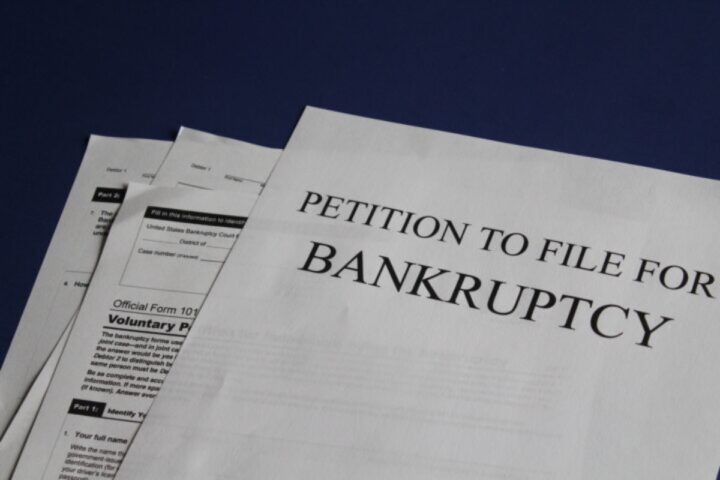Chapter 13 Ruined My Life
The numbers are shocking – 70% of Chapter 13 bankruptcy cases never make it to completion. These failed cases leave people in an even worse financial position than when they began. Chapter 13 bankruptcy sounds promising with its structured debt repayment plan. The reality turns out to be nowhere near as simple as most people think.
People only find out how tough Chapter 13 bankruptcy can be after they’re stuck in the middle of it. Strict payment schedules paired with constant money worries don’t deal very well with life’s unexpected turns. This piece gets into real Chapter 13 horror stories and shows what daily life looks like during bankruptcy. You’ll learn about what happens when these cases fall apart. This information gives vital insights to anyone thinking about taking this route to clear their debt.
The Hidden Traps of Chapter 13 Bankruptcy

Chapter 13 bankruptcy isn’t as straightforward as many people think. My decades as a bankruptcy attorney have shown me how people struggle to meet this debt relief option’s demands.
Understanding the 5-Year Payment Plan Burden
A structured repayment plan that runs three to five years is what Chapter 13 needs. Your income plays a big role here. People earning more than their state’s median must stick to a five-year plan. This long-term commitment leaves little room to save for emergencies or have any financial flexibility.
Why Most Chapter 13 Cases Fail
The numbers tell a sobering story – only 33% of Chapter 13 cases succeed nationwide. Several key factors drive this low success rate:
- Life throws curveballs during the 5-year period – job losses, health emergencies, or family issues crop up
- People set unrealistic payment goals in their eagerness to protect homes or assets
- Rules demand all spare income goes to debt repayment
This is a big deal as it means that two-thirds of confirmed Chapter 13 plans don’t make it. Failed cases often leave people worse off than before they filed.
The True Cost of Attorney Fees and Modifications
The costs go well beyond monthly payments. Legal fees run between $2,500 and $5,000 – much higher than Chapter 7 bankruptcy. Going it alone isn’t smart either. Cases without lawyers have a tiny success rate of less than 1%.
Plan modifications are possible when situations change. The court must approve any changes, and everything needs wrapping up within five years. You might get payment adjustments during tough times, but that five-year deadline won’t budge.
My Personal Chapter 13 Nightmare
My decades of legal practice reveal one compelling Chapter 13 case that shows how this form of bankruptcy can derail lives. Chapter 13 creates a cascade of unexpected challenges instead of providing immediate relief.
Original Hope vs. Harsh Reality
People start their trip with optimism as they foresee a well-laid-out path to financial recovery. Of course, the original consultation presents Chapter 13 as a lifeline – a way to save homes and reorganize debts. This hope quickly fades when reality hits. Completing a Chapter 13 repayment plan proves remarkably challenging, with all but one of these cases failing to reach successful completion.
Struggling with Payment Increases
The real nightmare surfaces when payment amounts unexpectedly increase. Several factors can trigger payment hikes:
- Changes in income or job status
- Completion of other debt payments, leading to increased plan payments
- Modifications required to catch up on missed payments
More than that, trustees typically file for case dismissal when debtors fall behind on payments. Debtors must request payment modifications, which courts cannot always accommodate.
Effect on Family and Relationships
The psychological burden of Chapter 13 reaches way beyond financial stress. So, the rigid payment structure affects every aspect of family life:
- All disposable income must go toward debt repayment
- Debtors cannot incur new debt without trustee approval
- The plan requires living on a fixed budget for up to five years
Many families find themselves trapped between maintaining bankruptcy obligations and meeting simple needs. Without doubt, this creates tension in relationships, especially when unexpected expenses arise or income changes occur. The stress intensifies when payment modifications become necessary, as courts can only reduce payments toward certain types of debt.
Life becomes especially difficult when dealing with secured debts like mortgages or car loans. A single missed payment can trigger foreclosure or repossession, even within an active Chapter 13 plan. This constant pressure to maintain payments while managing everyday life creates an overwhelming burden that many families cannot sustain.
The Psychological Toll of Chapter 13
The mental toll of Chapter 13 bankruptcy goes way beyond the reach and influence of money matters. It creates a maze of emotional challenges that catch many debtors off guard. Money worries and debt problems affect more than half of U.S. adults’ mental health negatively.
Dealing with Constant Financial Stress
Chapter 13’s burden puts intense pressure on everyday life. Rising living costs make 87% of Americans stressed. This stress becomes even worse for Chapter 13 debtors who must:
- Struggle with disrupted sleep
- Worry constantly about payment deadlines
- Feel anxious about possible plan failure
- Live with a tight budget’s restrictions
Social Stigma and Isolation
Bankruptcy’s shame often pushes people to cut themselves off from others. Like other big life challenges, many debtors find it hard to tell friends and family about their situation. Guilt and shame stop them from asking for help when they need it most.
Research shows that borrowers feel intense personal failure and shame about their debt. The stigma hits harder because bankruptcy proceedings are public records, though most people don’t bother looking up this information.
Mental Health Consequences
Chapter 13 bankruptcy leaves lasting psychological scars. Studies link unsecured debt to several problems:
- Depression and anxiety disorders
- Poor mental well-being
- High blood pressure
- More inflammation markers
Research shows that people in debt often skip medical care and eat less to pay bills, which leads to more health problems. These habits, combined with ongoing stress, show up as physical symptoms and long-term health issues.
The psychological weight stays heavy even after bankruptcy starts. Though Chapter 13 offers financial relief, 77% of Americans feel more anxious about their money situation. This constant stress creates a cycle – mental health struggles make it harder to keep up with Chapter 13’s strict rules.

Warning Signs I Should Have Recognized
Bankruptcy attorneys who have handled countless Chapter 13 cases can spot warning signs that clients often miss. Statistics show that 98% of people who file without a lawyer’s help fail to complete their Chapter 13 plans.
Red Flags in the Attorney Consultation
A good bankruptcy consultation should take its time and go deep into your situation. Yes, it is important to watch for these warning signs during your first meeting:
- No discussion about other ways to handle debt
- Rush to file bankruptcy without looking at options
- Quick review of your income and expenses
- Little talk about how your finances might change
- Not enough details about what five years of payments mean
Unrealistic Payment Expectations
Chapter 13 cases often fall apart because of unrealistic payment plans. Many people learn they can’t keep up with their mortgage or car payments while paying their Chapter 13 obligations. The court wants all extra money to go toward debt repayment. This leaves nothing for emergencies or surprise expenses.
Alternative Options I Overlooked
You need to know all your choices before jumping into Chapter 13 bankruptcy. Debt management through nonprofit credit counseling can give you similar benefits without bankruptcy’s harsh effects. These programs offer:
| Feature | Benefit |
|---|---|
| Lower interest rates | More affordable monthly payments |
| Single monthly payment | Easier debt management |
| No bankruptcy record | Better credit future |
| Flexible terms | Simple changes when needed |
People make mistakes by using retirement money to avoid bankruptcy. This money stays protected in bankruptcy and helps secure your future. Paying back friends or family before filing can also cause problems. Trustees might take back these payments.
Chapter 7 bankruptcy stands out as the most overlooked choice. It has a 96% success rate and offers faster debt relief without Chapter 13’s long payment plan.
What I Wish I Had Done Differently
Bankruptcy attorneys have learned that success depends on two key factors – preparation and timing. These elements can mean the difference between financial recovery and a long struggle.
Learning About Chapter 7 First
We looked at Chapter 7 bankruptcy as the first option before committing to Chapter 13’s lengthy repayment plan. A full picture shows clear differences:
| Feature | Chapter 7 | Chapter 13 |
|---|---|---|
| Success Rate | 96% discharge rate | 33% completion rate |
| Timeline | 3-5 months | 3-5 years |
| Cost | Lower fees | $2,500-$5,000 in attorney fees |
| Income Requirements | Must pass means test | Regular income needed |
Building an Emergency Fund
Building an emergency fund is a vital step to avoid bankruptcy. Financial experts suggest these savings targets:
- 3-6 months of living expenses for stable income
- 6-9 months for variable income sources
- Small, consistent monthly contributions
An emergency fund helps you avoid common Chapter 13 pitfalls by providing:
- Protection against unexpected medical expenses
- Buffer for sudden job loss
- Cushion for car repairs or home maintenance
Seeking Financial Counseling Earlier
Mandatory credit counseling happens only 180 days before filing bankruptcy. Starting counseling earlier gives you several advantages:
- Exploration of debt management programs
- Development of realistic budgeting strategies
- Assessment of alternatives to bankruptcy
Credit counseling agencies charge between $25 to $50 per session. Many offer fee waivers if you cannot afford services. Nonprofit credit counseling helps people find debt management programs that provide:
- Lower interest rates without bankruptcy stigma
- Single monthly payments for simplified management
- Greater flexibility in payment modifications
Early credit counseling often eliminates the need for bankruptcy. When bankruptcy becomes unavoidable, good preparation helps you make smart choices about timing and chapter selection.
Chapter 13 Ruined My Life Frequently Asked Questions
How damaging is Chapter 13?
Chapter 13 bankruptcy can be damaging to your credit score and stay on your credit report for up to seven years. It may make it harder to obtain new credit, secure loans, or get favorable interest rates. However, it can be a helpful tool for regaining control of your finances if you’re dealing with overwhelming debt, and it allows you to catch up on payments rather than losing assets like in Chapter 7.
Will Chapter 13 leave me broke?
Chapter 13 does not leave you broke, but it does require a restructured payment plan where you pay back a portion of your debts over a period of three to five years. While you will need to adhere to a strict budget and may need to cut back on spending, the goal is to help you regain financial stability without losing your property. Once the plan is completed, you may be in a better financial position.
Why do so many Chapter 13 bankruptcies fail?
Many Chapter 13 bankruptcies fail because people struggle to make their monthly payments on time. Life changes, such as job loss, medical emergencies, or other unexpected events, can interfere with the ability to stick to the repayment plan. Additionally, some individuals may not have fully understood the commitment or failed to adequately plan their budget.
What is the average Chapter 13 monthly payment?
The average monthly payment for Chapter 13 varies depending on your income, debts, and living expenses, but it typically ranges between $300 and $1,000 per month. The payment amount is determined by a court-approved plan, and it may be lower or higher based on your specific financial situation. It’s important to note that this payment can last for 3 to 5 years.
What not to do during Chapter 13?
During Chapter 13, it is crucial to avoid missing payments or failing to follow your repayment plan, as it can result in the dismissal of your case. Don’t incur new debt without consulting your bankruptcy trustee, as this could complicate your case. It’s also important not to hide assets or make fraudulent statements, as this can lead to serious legal consequences.
How to survive Chapter 13?
To survive Chapter 13, it’s essential to stick to your repayment plan and budget strictly. Make sure to prioritize your payments, avoid new debt, and communicate with your trustee if you encounter any difficulties. You should also seek professional advice if needed and take steps to rebuild your financial habits to avoid future bankruptcy.
What if I can’t afford my Chapter 13 payments?
If you can’t afford your Chapter 13 payments, you should immediately notify your bankruptcy trustee and attorney. In some cases, you may be able to modify the plan to reduce payments based on changes in your income or expenses. If the situation doesn’t improve, the court may dismiss the case, and you could consider other options, such as filing for Chapter 7.
Can you walk away from a Chapter 13?
While you cannot simply “walk away” from a Chapter 13 bankruptcy, you may be able to voluntarily dismiss your case if you no longer want to continue with the repayment plan. However, this could have significant consequences, such as losing any progress made in your bankruptcy or facing the continuation of your debt obligations. It is essential to consult with your attorney before making such a decision.
What disqualifies you from filing bankruptcies?
Several factors can disqualify you from filing for bankruptcy, including having filed for bankruptcy too recently. For example, if you’ve previously filed for Chapter 7 or Chapter 13, you may need to wait a certain period before filing again. Additionally, if you’ve been dishonest in your previous filings or failed to complete a required credit counseling course, you may be disqualified.


